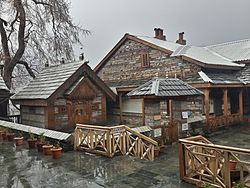Situated on the left bank of river Beas at an altitude of 1,800 meters, Naggar is an ancient town in Kullu district of Himachal Pradesh, India. It was once capital of the Kullu kingdom.[1]
Naggar | |
|---|---|
 | |
| Coordinates: 32°07′N 77°10′E / 32.12°N 77.17°E | |
| Country | |
| State | Himachal Pradesh |
| District | Kullu |
| Elevation | 1,800 m (5,900 ft) |
| Languages | |
| • Official | Hindi |
| Time zone | UTC+5:30 (IST) |
| Vehicle registration | HP |
| Sex ratio | 9:8 ♂/♀ |
Geography
editNaggar is located 22 kilometres (14 mi) north of the District headquarters at Kullu and 230 kilometres (140 mi) north of the state capital at Shimla.
It is bound by Kullu Tehsil towards South, Spiti Tehsil towards East, Drang Tehsil towards South and Lahul Tehsil towards North. Manali, Keylong, Mandi, Sundarnagar and Hamirpur are some of the nearby towns to Naggar.
Climate
editThe climate in Naggar is mild. In winter, there is much less rainfall than in summer. The average temperature is 16.6 °C. In a year, the average rainfall is 1,730 mm.[2]
History
editNaggar was the capital of the erstwhile Kullu Rajas for about 1400 years. It was founded by the Visudh Pal and remained as the State headquarters until the capital was transformed to Kullu (Sultanpur) by Raja Jagat Singh.
Naggar Castle, the official seat of kings for centuries. was built by Raja Sidh Singh more than 500 years ago. According to a legend, he used stones from the abandoned palace (Gardhak) of Rana Bhonsal to build the castle.[3] He ordered the labourers to form a human chain over the Beas river connecting its left and right banks to transfer the stones manually. The castle survived the earthquake of 1905. While most houses in the valley and the nearby city of Jawa were completely ruined, the castle's use of earthquake-proof techniques helped it sustain despite the calamity.
In 1978 it was taken over to Himachal Pradesh Tourism Development Corporation (HPTDC), to run as a heritage hotel.[5][6]
The Russian painter and explorer Nicholas Roerich settled in Naggar in the early 20th century. The Roerich Estate, his two-floor house, is now a museum and key attraction of the town featuring a collection of his popular paintings.[7]
Transport
editAir
editThe nearest airport is Bhuntar Airport in Kullu (IATA code KUU) located in Bhuntar town at a distance of 40.2 km (25 mi) from Naggar. The airport is situated on NH21 at a distance of 10 km (6 mi) south of Kullu and about 50 km (31 mi) south of Manali. Also known as Kullu-Manali airport, Bhuntar Airport has more than one kilometre long runway. Air India has regular flights to the airport from New Delhi.
Rail
editThe nearest narrow gauge railhead is at Joginder Nagar. One can travel to this railway station via Pathankot Junction, and further by a taxi or cab.
Road
editNaggar is easily accessible through the buses run by HPTDC. These buses ply from Manali to Naggar via Khaknal. The road distance from Manali to Naggar via NH3 is 22 km (13.6 mi) while via Khaknal is 21 km (13 mi).
Access
edit- Distance from Delhi: 589 km
- Distance from Shimla: 246 km
- Distance from Kullu (main town): 26 km
- Distance from Manali: 22 km
Attractions
edit- Nicholas Roerich Art Gallery
- Gauri Shanker Temple
- Tripura Sundri Temple[8]
- Vasuki Nag Temple
- Naggar Castle
- Krishna temple
References
edit- ^ Denis, Eric; Zérah, Marie-Hélène (1 March 2017). Subaltern Urbanisation in India: An Introduction to the Dynamics of Ordinary Towns. Springer. ISBN 9788132236160.
- ^ "Climate Naggar: Temperature, Climate graph, Climate table for Naggar - Climate-Data.org". en.climate-data.org. Retrieved 22 September 2017.
- ^ "The Sunday Tribune – Spectrum". www.tribuneindia.com. Retrieved 22 September 2017.
- ^ Ajay Kamalakaran (2 May 2012). "Nicholas Roerich's legacy lives on in Himalayan Hamlet". rbth.com. Retrieved 31 May 2021.
- ^ "The Castle, Naggar". hptdc.in. Archived from the original on 19 June 2018. Retrieved 19 June 2018.
- ^ "Tourism in Naggar". tourism-of-india.com. Archived from the original on 19 June 2018. Retrieved 19 June 2018.
- ^ Kamalakaran, Ajay (2 May 2012). "Nicholas Roerich's legacy lives on in Himalayan Hamlet". Retrieved 19 September 2017.
- ^ "Himachal Tourism". Himachal Tourism Department. Archived from the original on 24 March 2010. Retrieved 12 April 2020.

